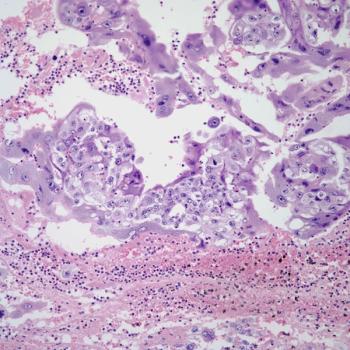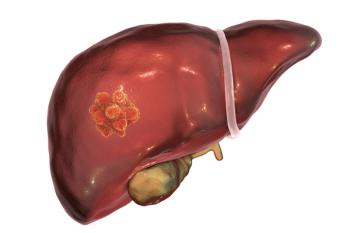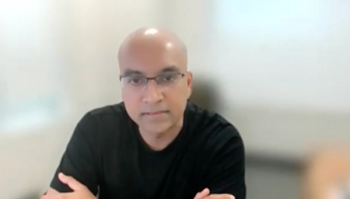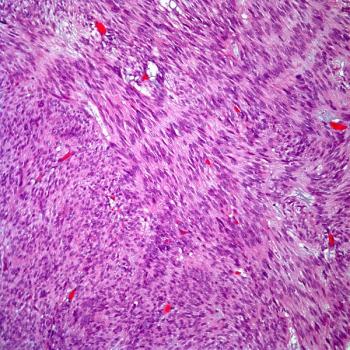
Use of the surgical Epione robot will save a significant amount of time when performing surgery for patients with liver tumors and potentially other cancers, says Govindarajan Narayanan, MD.

Your AI-Trained Oncology Knowledge Connection!


Use of the surgical Epione robot will save a significant amount of time when performing surgery for patients with liver tumors and potentially other cancers, says Govindarajan Narayanan, MD.

The preliminary safety and efficacy of SONALA-001 is being assessed as part of the SDT-201 study in diffuse intrinsic pontine glioma.

Approval of PD-L1 IHC 22C3 pharmDx may also identify patients with non–small cell lung cancer and other malignancies who may benefit from treatment with pembrolizumab.

Asher A. Chanan-Khan, MBBS, MD, led a panel discussion surround the use of Bruton tyrosine kinase inhibitors for patients with chronic lymphocytic leukemia.

Investigators report that loss of MMR mechanism is not predictive of response to chemotherapy or pembrolizumab in patients with stage III or IVA, stage IVB, or recurrent endometrial cancer.

A case study by Sahith Kumar Shetty, BDS, MDS, et al reviews the need for a multidisciplinary approach to the treatment of patients with Gorlin-Goltz syndrome.

Data from the phase 3 KEYNOTE-A18 study may support pembrolizumab plus chemoradiotherapy as a new standard of care for those with newly diagnosed, high-risk, locally advanced cervical cancer.

Data from the phase 3 CHRONOS-4 study highlight that copanlisib did not reach the primary end point of progression-free survival among patients with relapsed follicular lymphoma.

Durvalumab plus olaparib, durvalumab monotherapy, or chemotherapy plus durvalumab saw an improvement in progression-free survival for patients with newly diagnosed advanced or recurrent endometrial cancer.

The safety profile of durvalumab plus TACE and bevacizumab in patients with hepatocellular carcinoma in the phase 3 EMERALD-1 study appears to consistent with previous findings.

Adagrasib, which now has a positive CHMP opinion, was previously examined as part of the phase 1/2 KRYSTAL-1 study.

If momelotinib receives approval in the European Union, it will become the only agent for the treatment of myelofibrosis coupled with moderate to severe anemia.

Karmanos Cancer Institute and Cleveland Clinic gave presentations regarding treatment of multiple myeloma and chronic myeloid leukemia in the latest Face Off.

Next steps for research in lung cancer may include identifying how the gut microbiome impacts responses and adverse effects associated with treatment, says Misako Nagasaka, MD, PhD.

Radiographic progression-free survival outcomes with olaparib plus abiraterone acetate and prednisone appear to be consistent with prior analyses of the phase 3 PROpel trial.

Sara M. Tolaney, MD, MPH, gives an extensive overview on the current breast cancer landscape and available treatment options.

Misako Nagasaka, MD, PhD, and Kristen Neumann, DNP, FNP-C, discussed how to best mitigate adverse effects in patients with non–small cell lung cancer.

Arvind N. Dasari, MD, lead investigator of the FRESCO-2 trial, spoke about the recent approval of fruquintinib for patients with previously treated metastatic colorectal cancer.

The 3-year PFS rate for patients with MCL was 94%, and the OS rate was 97%

Continued manufacturing of methotrexate may improve access to chemotherapy for patients with breast cancer, lung cancer, and other malignancies in the United States.

Laura S. Wood, MSN, RN, OCN, spoke to Physician's Education Resource regarding resources to increase clinical trial awareness and participation.

Data from the phase 1/2 TRANSCEND CLL 004 study support an application for liso-cel as a treatment for patients with relapsed/refractory chronic lymphocytic leukemia or small lymphocytic lymphoma.

Howard S. Hochster, MD, reviews the potential solutions for the current chemotherapy drug shortages, and how this can be avoided in the future.

Only patients with PD-L1–positive tumors may receive treatment with pembrolizumab plus trastuzumab and chemotherapy for HER2-positive gastric or gastroesophageal junction adenocarcinoma following the FDA’s amendment.

Early CT screening leads to a 20-year lung cancer survival rate of 81%.

Results from the phase 3 FRESCO-2 trial support the approval of fruquintinib for patients with previously treated metastatic colorectal cancer.

Investigators note that prospective research is needed to confirm the efficacy of vitamin D supplements in preventing chemotherapy-induced peripheral neuropathy in patients with breast cancer.

CHM 2101 will be assessed as part of a phase 1A/B clinical study in a population of patients diagnosed with advanced colorectal cancer, gastric cancer, and neuroendocrine cancer.

AL102 is being assessed as part of the phase 3 RINGSIDE trial in patients with desmoid tumors.

CMG901 demonstrated a well-tolerated safety profile in patients with CLDN18.2-positive, advanced gastric/gastroesophageal junction cancer.